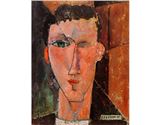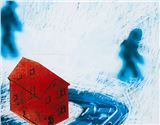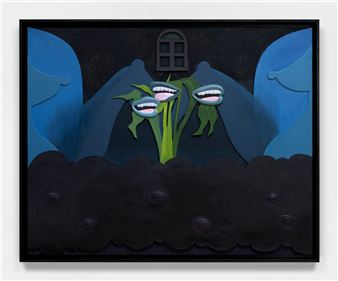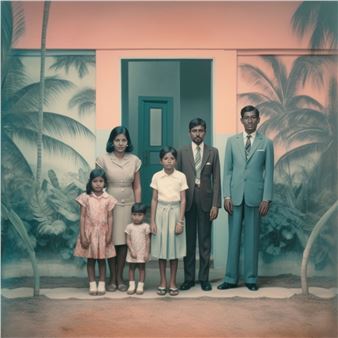Jamea Richmond-Edwards: Another World and Yet the Same
Jamea Richmond-Edwards is an interdisciplinary artist working in painting, collage, sculpture and video. For the past decade, much of her work has foregrounded the communities and cultural signifiers of her hometown of Detroit, and has served as a means of processing and contextualizing her own life’s journey and as a meditation on larger social and environmental concerns. Most recently, her wide-ranging research interests—which span religion, history, mythology, and ancestry—have informed monumental paintings that offer complex narratives addressing humanity’s shared histories while also exploring social constructions of race, class and nationalism. For her exhibition at the Wellin Museum, Richmond-Edwards will present existing works alongside a newly created video, small scale sculptures, and suite of paintings, two of which are displayed within Ancient Egyptian inspired frames. Points of inspiration in this body of work include the biblical stories of Exodus, the science-fiction mythology of jazz musician Sun Ra, the exploration of terrestrial continents both real and imagined, and the impending effects of climate change upon our planet’s most vulnerable geographies.
The exhibition’s title is borrowed from the seventeenth-century dystopian literary work of the same name, Mundus alter et idem, an imaginary account of a voyage to the oceans south of Africa written by Joseph Hall (1574–1656) as a satirical indictment of the power structures of early modern British culture. In Richmond-Edwards’s new works, she adapts this narrative to focus on a fictive character of her own making, Iceberg, who appeals to his own family members and close friends to embark upon an oceanic caravan to Antarctica, where a new, egalitarian society might be established. This fictionalization presents the inherent challenges for a utopian state located on a rapidly shrinking continent, and mirrors the contemporary crises of nations that are either under threat from rising sea levels or are exploring the promises and pitfalls of self-determination and independence.

Recommended for you
Jamea Richmond-Edwards is an interdisciplinary artist working in painting, collage, sculpture and video. For the past decade, much of her work has foregrounded the communities and cultural signifiers of her hometown of Detroit, and has served as a means of processing and contextualizing her own life’s journey and as a meditation on larger social and environmental concerns. Most recently, her wide-ranging research interests—which span religion, history, mythology, and ancestry—have informed monumental paintings that offer complex narratives addressing humanity’s shared histories while also exploring social constructions of race, class and nationalism. For her exhibition at the Wellin Museum, Richmond-Edwards will present existing works alongside a newly created video, small scale sculptures, and suite of paintings, two of which are displayed within Ancient Egyptian inspired frames. Points of inspiration in this body of work include the biblical stories of Exodus, the science-fiction mythology of jazz musician Sun Ra, the exploration of terrestrial continents both real and imagined, and the impending effects of climate change upon our planet’s most vulnerable geographies.
The exhibition’s title is borrowed from the seventeenth-century dystopian literary work of the same name, Mundus alter et idem, an imaginary account of a voyage to the oceans south of Africa written by Joseph Hall (1574–1656) as a satirical indictment of the power structures of early modern British culture. In Richmond-Edwards’s new works, she adapts this narrative to focus on a fictive character of her own making, Iceberg, who appeals to his own family members and close friends to embark upon an oceanic caravan to Antarctica, where a new, egalitarian society might be established. This fictionalization presents the inherent challenges for a utopian state located on a rapidly shrinking continent, and mirrors the contemporary crises of nations that are either under threat from rising sea levels or are exploring the promises and pitfalls of self-determination and independence.

 ARTISTS
ARTISTS













